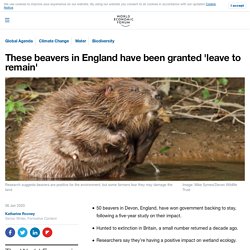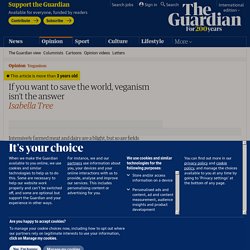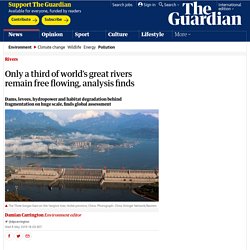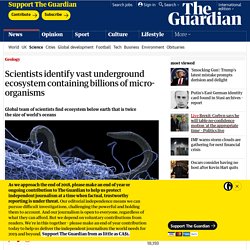

These beavers in England have been granted 'leave to remain' 50 beavers in Devon, England, have won government backing to stay, following a five-year study on their impact.

Hunted to extinction in Britain, a small number returned a decade ago. Researchers say they’re having a positive impact on wetland ecology. Effects observed include creating new habitats for wildlife. Wild beavers hadn’t been seen in England for hundreds of years. Then, in 2008, a colony appeared on the banks of the River Otter in the county of Devon. In 2015, a few were captured, tested for disease and released back into the river after receiving a clean bill of health.
Since then, they have been under observation as part of a trial run by the Devon Wildlife Trust, designed to demonstrate that beavers can have a positive impact on their natural environment and create benefits for the local community. In what has been hailed as a ground-breaking government decision for England's wildlife, environment minister Rebecca Pow said beavers could be considered a "public good".
BioGraphic (California Academy of Sciences) Crash Course Kids - Life Science: Ecosystems and Flow of Energy. PBS Learning Media -so many great resources! A rewilding triumph: wolves help to reverse Yellowstone degradation. Twenty-five years ago this month, wolves were reintroduced to Yellowstone, America’s first national park and an ecosystem dangerously out of whack owing to the extirpation of its top predator.

This monumental undertaking marked the first deliberate attempt to return a top-level carnivore to a large ecosystem. Now scientists are celebrating the gray wolves’ successful return from the brink of extinction as one of the greatest rewilding stories the world has ever seen. If you want to save the world, veganism isn’t the answer. Veganism has rocketed in the UK over the past couple of years – from an estimated half a million people in 2016 to more than 3.5 million – 5% of our population – today.

Influential documentaries such as Cowspiracy and What the Health have thrown a spotlight on the intensive meat and dairy industry, exposing the impacts on animal and human health and the wider environment. But calls for us all to switch entirely to plant-based foods ignore one of the most powerful tools we have to mitigate these ills: grazing and browsing animals. Rather than being seduced by exhortations to eat more products made from industrially grown soya, maize and grains, we should be encouraging sustainable forms of meat and dairy production based on traditional rotational systems, permanent pasture and conservation grazing. The animals live in natural herds and wander wherever they please. 's National Ocean Service: Infographics. Only a third of world’s great rivers remain free flowing, analysis finds. Only a third of the world’s great rivers remain free flowing, due to the impact of dams that are drastically reducing the benefits healthy rivers provide people and nature, according to a global analysis.

Billions of people rely on rivers for water, food and irrigation, but from the Danube to the Yangtze most large rivers are fragmented and degraded. Untouched rivers are largely confined to remote places such as the Arctic and Amazonia. The assessment, the first to tackle the subject on a worldwide level, examined 12m kilometres of rivers and found that just 90 of the 246 rivers more than 1,000km (621 miles) long flowed without interruption. The scientists, whose research, published in the journal Nature, was led by Günther Grill, at McGill University in Canada, were particularly concerned to discover that only a quarter of long rivers that once flowed freely to the sea, rather than to an inland lake or other river, still had such a course. Human impact leading to ‘desertification’ Scientists identify vast underground ecosystem containing billions of micro-o... The Earth is far more alive than previously thought, according to “deep life” studies that reveal a rich ecosystem beneath our feet that is almost twice the size of all the world’s oceans.

Despite extreme heat, no light, minuscule nutrition and intense pressure, scientists estimate this subterranean biosphere is teeming with between 15bn and 23bn tonnes of micro-organisms, hundreds of times the combined weight of every human on the planet. Researchers at the Deep Carbon Observatory say the diversity of underworld species bears comparison to the Amazon or the Galápagos Islands, but unlike those places the environment is still largely pristine because people have yet to probe most of the subsurface.
“It’s like finding a whole new reservoir of life on Earth,” said Karen Lloyd, an associate professor at the University of Tennessee in Knoxville. “We are discovering new types of life all the time. So much of life is within the Earth rather than on top of it.” … we have a small favour to ask.